Recent
- Lisa Kusel

- Sep 7, 2023
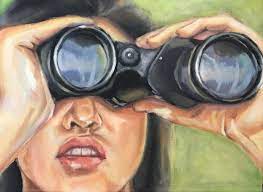
When it snows in Burlington, Vermont, human behavior shifts. One doesn’t simply stare contentedly out the window as the thick swirling flakes drop from the sky, sighing at the beauty of it all as you sip peppermint tea. I mean, certainly, you can do that, but if you don’t act fast, you risk not being able to back your car out of the garage. You must, instead, don a fluffy coat, one that hypes its ability to keep you warm in sub-zero temperatures. Don’t forget your hat. And gloves. Good gloves are essential to the task you are about to perform. They should not only keep your hands warm—they should also allow you to keep a firm grip on a cold metal pole for a very long time. But wait, don’t put on your gloves until after you lace up those snow boots, the ones that weigh as much as a bowling ball. Now you are ready to go outside, where, within ten minutes, you will be unzipping that sub-zero coat because you are sweating so much. After a few perfunctory “good morning” waves to the neighbors who are already at it, you begin to shovel away the ever-growing drifts before they freeze and harden. You clear the sidewalk at the end of the driveway first. Then, before you can tackle the area behind the one-car garage where you park
car, you set to brushing away the foot of accumulated snow from your wife’s car. After it’s clear, you come back inside, grab her keys and back her car into the street. Once the entire driveway is shoveled—at this point you are wearing nothing but a T-shirt and your hands are pulsing—you back your car out of the garage then pull your wife’s car into the snow-free driveway, come inside to shower and get ready for work. Your wife spends the day writing, as is her normative behavior. As the hours and winter storm progress, she sees from her office window her car getting buried once again. But she doesn’t care: she has no plans to go anywhere. She has no errands to run. No friends to meet. A day passes and the snow abates. You yell, “Goodbye! I’m going to work,” and leave the house. Your wife continues to drink tea and edit the book that her agent is sure will be a big hit. Just as she finishes typing the word
into her Word document, she hears you come back inside.
“Um, sweetie,” you say from so far away she’s not sure she hears you correctly. “What?!” she screams, because oh god she hates to be interrupted when she’s writing. You don’t reply—rather you clomp up the stairs and stand in the doorway to her office, a look of utter dismay on your face.
“Someone broke into your car,” you say more nonchalantly than the news necessitates.
“What? How is that possible?” your befuddled wife yells, jumping up from her desk and running into the bedroom to put on clothes, since, at the moment she is wearing only a black nightie and fleece socks.
She slides on sweatpants, her daughter’s castoff BHS sweatshirt, wool socks, and skitters down the stairs, almost careening into the hall closet door, which she tears open while you, following slowly behind her, stutter out some inchoate, incoherent words of explanation.
She slams on the first hat she can find, slides her feet into her purple UGGS, shoves her balled-up fists into some wool gloves and rushes out the door, slowing just enough to keep from slipping and falling (yet again) on the steep and icy sidewalk leading from the house to the driveway.
Tentatively approaching the car as if it’s been sprayed with poisonous gas, she reaches out to the door handle, but before she opens it she whips around and peers into your face. “They didn’t break any windows. You fucking forgot to lock it yesterday, didn’t you?!”
“Oh my God,” she whimpers, when she opens the door.
Everything that wasn’t bolted down in her 2018 Rogue SL is gone.
Literally, everything.
She begins to shake with anger, cursing not just you but the ever-growing population of desperate drug addicts who have taken over Burlington’s streets. Cars and homes are being broken into more often. Used hypodermic needles litter the sidewalks and alleyways and parks. Until a police-person shows up to shoo them away, homeless people stake out camping sites in children’s playgrounds.
But these are not the thoughts running through her frantic and furious mind, no. Your wife is too busy compiling a mental checklist of all the trivial and not-so-trivial items she will need to replace.
And that’s when it hits her, hard, in her solar plexus: they took the large diamond-shaped necklace on the chunky gold chain that hung around the rear-view mirror: a touchstone to her dead mother; a kitschy piece of costume jewelry she would finger whenever she’d get into the car before whispering, “Hi, Mom.”
“I hate you,” she gurgles over her shoulder as you stand there, contrite hands in pockets.
“I’m sorry, sweetie,” is all you offer. “I thought I’d locked it.”
“Well, you thought wrong,” she replies, peering into the gaping emptiness of the glove compartment. “Shit. They took my binoculars. Tim gave those to me twenty years ago.”
Once she has taken account of all the things that she is pretty sure were taken from the car, she files a police report, knowing 100% that they will do nothing. Still, it calms her to see the list of stolen goods, tidily organized:
Mom’s necklace, a beaded necklace made by Loy, Nikon binoculars, Rogue owner’s manual, a fake diamond ring, a crystal, KN 95 masks, a box of tissues, lip balm, an open bag of Red Hots, 2 pairs of cheap gloves, a tube of hand lotion, a tube of sunscreen, 2 pairs of reading glasses, 2 pairs of sunglasses, Swiss Army knife, nail clippers, a pair of contact lenses, a towel, a map of Vermont, 2 pens, a pad of paper, a phone charger thingy, an air pressure thingy, a bottle of Advil.
She is heartened by the fact that the person or persons who pillaged her car did not defecate, urinate or leave used needles on the backseat: a common occurrence in many of the recently-reported car-crime cases.
She is sad, but she also feels lucky.
Immediately, she calls three pawn shops and describes her mother’s necklace to the nice men on the phone and asks them to please get in touch if someone tries to sell it.
She scours Facebook Marketplace and Craigslist, hoping to find the necklace and/or the binoculars for sale.

Months pass. She finds a similar-looking necklace on Etsy and buys it. When she explains to the seller that it kind of looks like her mother’s stolen piece, the woman offers her a 15% sympathy discount. And then, then…just this past week, long after she’s stopped trying to recover her lost goods, she clicks on FB Marketplace and sees her binoculars for sale. A very old pair of Nikon Travelite binoculars. Her binoculars. They are listed for $20.
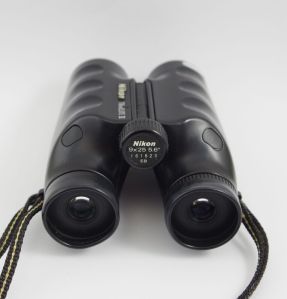
She immediately writes to the man, whose blurry profile doesn’t engender good vibes, but she thinks maybe she’s just projecting her anger onto him, but anyway, she writes him and says, “I will buy these NOW,” and he tells her where he lives and when she sees it’s Decker Towers, the looming 11-story subsidized housing project down the street, she feels in her gut that THIS guy is the guy who broke into her car and she is going to make him PAY.
She grabs the replica necklace out of her car before proceeding down the street to Smalley Park, the halfway point between her house and Decker Towers. Once she has the binoculars safely in hand, she plans to show him the false necklace and demand he give her the real necklace back. She tells you all this and you say you are going with her, to stand watch, as if, six months later, you are still trying to apologize for screwing up so royally. She says, “No, thanks,” and slams out the door. At the park she paces. Her heart beats loudly in her chest. He’s already 7 minutes late when he texts her, “Where you at?” “Smalley Park.” “I thought you said the park by the City Hall.” “That’s City Hall Park.” She wonders how he could have gotten this so wrong. Doesn’t he live in Burlington? Five minutes later a dark-haired, very muscular, sweet-faced twenty-something man zooms up to her on an old bicycle. He is holding in his hand a case. A binoculars case. Something she did not have. These binoculars are not her binoculars. Given that they are the same kind that were stolen and they are cheaper than anything she’s seen on eBay, she digs around in her pocket, finds the $20 bill tangled in the counterfeit necklace, and hands it to him. And, as she is never one to let a good story go untold, she asks, “Why are you selling these?” “They are my father’s,” the man answers in a thick indiscernible accent. “I need the money, so…” he trails off. A ruby-colored stone encased in a silver dragon claw hangs from a thick silver chain around his neck. Although she finds it garish, she politely admires it while casually asking, “Where are you from?” “Ukraine.” “Ugh, I’m sorry.” She knows she shouldn’t pry, but it’s in her nature to pry so she asks, “Is your family still there?” trying not to stare at the sharp talons. “I was able to get them to Romania. They are safe. For now,” he says proudly. “But I have no idea what is the future.” She shifts on her feet, feeling the guilt begin to trickle up inside her. She had been poised to catch a thief. She’d imagined that she was going snatch the binoculars out of his hands and shout, “You stole these!” and then—what?—run? Call the police? She hadn’t bothered to play out the entire scenario in her head, but she was sure she was going to win.
Now, though, she feels only loss. She cannot, no matter how hard she tries, imagine the pain he must be feeling: his family is uprooted. His homeland has been invaded. He is living in a public housing building
. He has been reduced to selling his father’s precious items for less than they are worth. All she had to do was buy a new tube of Chapstick. She lifts the binoculars to her face and peers through the lenses instead of at him. “I'm so happy to have binoculars again,” she says, the familiar weight a comfort in her hands. "Thank you for selling them to me." “Yes,” the man with the ruby necklace replies, “it is good to be able to see so far away.”
- Lisa Kusel

- Jun 20, 2023
I. It was our last night together. The last time Ziggy and Beulah would ask the nineteen of us to join them in the Chateau’s large ornate drawing room. Not for a talk, a reading, a lesson or lecture, no.
Tonight, we would be gathering to share our final thoughts.
Slowly, hesitantly, as if trying to hold off the finality of our fortnight’s joy, the lot of us trickled in and arranged ourselves in a patchy circle on velvety high-backed chairs and overstuffed couches.
Once the chatter quieted, Ziggy began by saying how much he enjoyed hosting our group, more so, he seemed to imply, than any of the groups that preceded us.
A few cynical eyebrows were raised, mine among them. As the founder and director of the Chateau Orquevaux Artist Residency, Ziggy Attias probably said the same thing at the close of every two-week session. No one could fault him for wanting the artists and writers in the room to feel extra special. Among the thousands of applications he and Beulah van Rensburg (the residency director) received, we were the people they chose. It was their job, after all, to celebrate us.
As Ziggy spoke, I glanced around at my fellow artisans. Were we, I wondered, “better” or “different”? Did we have extraordinary chemistry? Was the camaraderie we shared over the last two weeks somehow unique? More intense? Did the two directors think the art we created—the stories and poems and videos and songs and paintings and podcasts and illustrations and aquatic installations and collages and jewelry—just a little more, um, creative?
My speculations were interrupted when Ziggy swept his champagne flute-holding hand in an arc across the faces of the people I’d come to know far more intimately than I’d ever expected, and said he’d like each us to speak about our time at the residency. What, he asked, is your takeaway?
“Let’s start over here,” he said, pointing to his left.

I’d been slouching back on the couch in the right corner of the room, but as soon as I heard the first person begin to speak, I bolted upright. Put my glass of champagne (or was it gin?) on the ottoman, using one of the many art books strewn about as a coaster. “Shit,” I uttered under my breath. What on earth was I going to say?
How would I distill the last two weeks down into a few sentences?
Four more people spoke. I began to panic. FUCK. Everyone was saying such lovely heartfelt things. Someone on the back couch started to cry.
I’d been eating, dancing, drinking, talking, walking, playing and creating with these people for fifteen days. All I had to do was say I had fun, right? Right?
But I’m a writer, I thought. I needed to say something PROFOUND.
And then, suddenly, it was my turn. II.
And the day came when the risk to remain tight in a bud was more painful than the risk it took to blossom. —Anaïs Nin
In the before-times, I rarely held back from trying new experiences. I had no fear. Not of failure. Not of rejection. Not even of disappointment. Risk-taking was second nature to me.
But then 2020 rolled around and the world changed. Months into the pandemic I tumbled headlong into Illness. Then Death. Soon, I was hiding behind imagined walls. I doubted everything and everyone, particularly myself.
By the time I received my letter of acceptance into the Residency in late 2022, I was still hiding. Still asking but what if______? so often the question had become an emotional crutch. My excuse for not doing anything (other than sitting at my desk, dredging up dark plot lines).
Friends and family urged me to suck it up, buy a plane ticket and, for fuck’s sake, GO TO FRANCE!
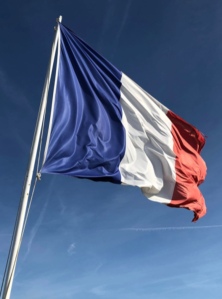
After many days of meditating, YouTube watching, fence-sitting and soul searching, I relented. I replied to Ziggy, saying, “Yes, I will accept your invitation. Thank you.” And then I started planning my first trip, my first adventure, my first foray out into the world, in a long long time.
III.
About a month before the May residency was to begin, the Chateau created a private Instagram message group. It took a few days for everyone to sign on, but soon we were all introducing ourselves, learning about the new Covid policies, sharing itineraries, and getting info. about the best way to ship art supplies overseas.
Naturally, I Googled every single person I was going to be living in close quarters with for two weeks. I was worried there wouldn’t be anyone I could relate to. There would be too many young people. Not enough non-Americans.
And boy oh boy, did I become a judgy bitch.
“Why were two other people from Vermont also chosen? It’s supposed to be an international residency. I don’t want to hang out with Vermonters.”
“Why is that chick with the cello so outspoken? She’s being such a queen bee.”
“The woman from Australia won’t stop complaining about having to test for Covid! Doesn’t she realize I only agreed to go because they’re requiring testing? God, I hate her already.”
“What’s with the pool noodle couple? That’s so wacky.”
“Why is that young dude not adding anything to the conversation? Who does he think he is?”
After two weeks of floating through the fray, I decided I wasn't going. I came up with a thousand reasons why attending an overseas artist residency was the worst possible idea .
I haven’t been in a room with strangers for three years. I don’t know how to make casual conversation anymore. Do I even want to talk to these people? No one will like me. I’m not talented enough to hang out with other artists. Surely, the food won’t be as good as it looks on all those Instagram posts. I’ll get Covid and die. It will suck. I’m afraid to go.
IV.
On April 30, I flew to Paris. After spending two days at an
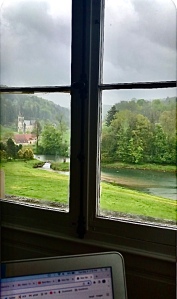
Airbnb to get over jet lag, I found my way to Chateau Orquevaux, where I was promptly shown up to my room which looked out across the lake to the tiny village beyond.
It was far lovelier than I ever could have imagined.
In fact, everything about my days at the Chateau was far lovelier than I ever could have imagined.
Which was why, when it was my turn to speak, I found it impossible to say a thing.
So, I said nothing.
If I’d been given more than five minutes to speak; if I’d had fewer drams of gin flowing through my bloodstream; and if I’d perhaps felt less inhibited about speaking my heart in public, I would have said this:
To the lovely young Canadian woman, I would have said, “Thank you for your quiet kindness. I so so loved The Snail and the Chateau. It is a whimsical and beautifully-drawn tale and I hope it will someday be read by millions of children.”
To the mother half of the duo from Vermont, I would have said, "I can’t believe I was worried about hanging out with a homey. You’re amazing. I mean, you have this incredible personal history. You teach. You paint. You are always smiling. I cannot wait to see you again.”
To the woman who, on the very first night, shared with me her intimate secrets and worries, I would have said, “You are more than the sum total of your past parts. You are daring and strong and a vastly talented artist. The world is your oyster and I implore you to slurp away, making as much noise as possible as you do.”
To the young guy who looked like Harry Styles I would have said, “Hey, thanks for joining me at breakfast that first morning. Even though you mispronounced Yeats’ name, I fell head over heels in like with your youthful passion and I look forward to seeing where your charisma, your intensely good poetry and those bedroom eyes of yours take you. It was a blast hanging out, vaping, sharing secrets, and discussing writerly shit."
To the California artist who made so much noise above me I wanted to kill her, I would have said, “Thank you for being patient with my neuroses. For turning down the sound on your computer at night. Your artwork blew my mind and I am so glad it exists. It makes the world a more beautiful place indeed. Oh, and congrats on becoming a grandmother.”
To the Australian who whined about the Covid testing, I would have said, “Thank you for sharing that sushi dinner with me in Chaumont. Even though the food was mediocre, I loved listening to your salacious stories and getting to know someone my age who is far far braver than I. Not a day goes by that I don’t admire the small print I took from your Open Studio. For someone who came to art later in life, I am beyond impressed by your talent. To be sure: you’re a force to be reckoned with.”
To the southern belle with the heart of gold, I would have said, “Sigh. Knowing you has gladdened my soul. Your powerful words shall continue to ripple, long after you’ve spoken them. I wish to know you always.”
To the cello-playing queen bee, I would have said, “You couldn’t help it: you were the brightest star in every room you walked into, even when you weren’t wearing that pink ballgown. Even when you walked in late (which was always). Thank you for the massage. For the black shirt. For the sweet sounds that floated up through my floor. For the sad moments, and for the many many laughs. Oh dear lord, the laughs. Stay in touch, please.”
To the twins who walked a million miles, I would have said, “Thank you both for the moments of grace. For the stories and the flowers. Thank you for the commiserative ankle twists and your all-around genuine goodness.”
To the Canadian journalist, artist, and lighthouse loiterer, I would have said, “Girlfriend, I need to come see you soon. I'm such a fan of your artwork. And your writing. And your uber fascinating tales about yonder icy places. You are the whole package and I’m so happy to have met you.”
To the California chick who I must have known in another life, I would have said, “Baby, you are a wonder. A magical mystery tour of a spirit like no other. You can sing with your mouth closed. You can create art with your eyes shut. Your energy fed me when I hungered. Your body danced when I needed to stay still. Forever in my heart. You. You.”
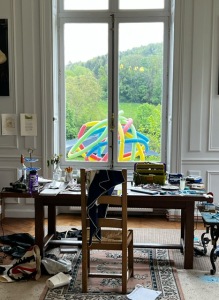
To the cutest married couple roaming this crazy planet, I would have said, “Okay, so the pool noodle/water/river art stuff is pretty darn awesome and far more metaphorically-relevant than I would have guessed. From watching the gold paint dry to the pre-dinner cocktails, the two of you made every moment we were together more delightful. More intriguing. Certainly more classy. I really hope to run into you again.”
To the curly-haired podwriter/animator/traveler, I would have said, “I’m sorry I kicked you out of the bathtub. You are very funny and one of the most delightful humans I’ve ever known. I wish you the best of luck for Season Two and for all your future wanderings. Oh, and No Dictators For Breakfast!”
To the chess-playing, prize-winning author, I would have said, “You are such a sweet man. Not a single meal spent with you was anything less than fascinating. Thank you for always listening with both ears. And for sharing your stories.”
To the Canadian wedding goddess who moved so quietly you never heard her come up behind you, I would have said, “For some reason, I never didn’t want to be near you, yet I never spent enough time with you. I kept saying I would come to your studio, but I never did, and for that I am sorry. What you produced down there in the Stables was stunning. Is there anything you cannot do? It was fun watching you make your sake drinks. Listening to your lore. There was something about your rich presence that both intimidated and fascinated me. I wish I lived closer to you.”
To my favorite, I would have said, “No, I won't adopt you, but yes, if you die before I do I will write your obituary and I will make it very very funny. There is nothing I wouldn’t do for you, kiddo. Keep climbing—literally and figuratively. You are a star with a million years of light inside waiting to shine.”
To the Vermont daughter whose eyes are as bright as the precious stones that adorn her stunning creations, I would have said, “Thank you for producing my first ever (and most likely only) Instagram reel. And for making that brilliantly funny group TikTok—I don’t think I ever laughed so much. Thanks also for letting me wander in and out of your and your mom’s studio during the day; the two of you below me, lost in your separate projects, yet still connected through an enviable love."
To the artist-in-residence who carried my suitcase up the stairs that first day, I would have said, “You know, when I first met you I thought you were a little cold. Distant. What a difference two weeks can make, ya? I mean, there we were on the last day: you were watching us pile into the van that would take us away to the train station, and I saw your tears. I felt your sadness. We were that kind of group, weren’t we? Or, maybe, you’re that kind of woman—you feel stuff, deeply. It shows in your art. I felt it in your hug goodbye. Thank you for taking such good care of us."
To the coolest, most stylishly-dressed artistic director, I would have said, “I think every person in this room has a massive crush on you, you know. How could we not? You were so helpful, so accommodating, so supportive, so bloody PRESENT for every single resident. Your laugh is adorably infectious. Your talent infinite. Your warmth and charm and endless enthusiasm are the reasons I will tell all my artist friends to apply to this residency. Now."
To the slightly grumpy but fiercely charitable director,
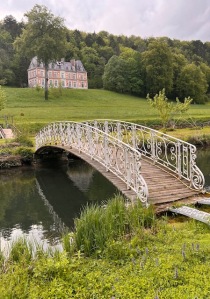
I would have said, “You are the consummate visionary; a man willing to take risks for a goal greater than himself. Out of your own tumultuous history you have built a thing of beauty. I mean, what kind of person decides to turn an old building into a castle and then invites strangers in to share its magic? Your kind of person. Thank you for opening these hallowed doors to me. To us. I am profoundly grateful."
V.
But I didn’t say any of those things.
Instead, I spent my allotted time making eye contact with every individual around the circle, silently thanking each and every one of them for reminding me that there’s still a deep, dazzling world beyond my own room. I thanked them for the affection—both emotional and physical (also, for not bumping into my shoulder). And then, with my eyes closed and my hands posed as if in prayer, I thanked them for helping me discover my creative spirit and self-love once again.
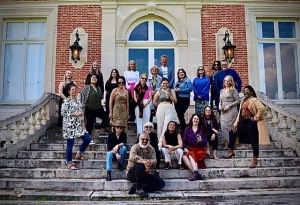
I will miss you all. Especially you, Dusty. x
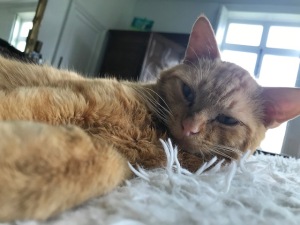
- Lisa Kusel

- Jan 5, 2023
Updated: Apr 30
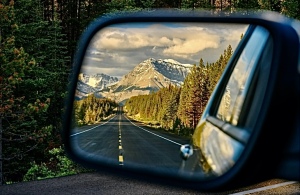
While I was eating lunch yesterday, Kathy, an agent from our car insurance company called to update the credit card they have on file. Instead of telling her I was in the middle of enjoying a bowl of hot soup and she should call back later, I put down my spoon and said, “Sure, let me go find it.”
The silence on the phone, broken only by the sound of my breathing as I climbed the stairs to my office, was so awkward, I felt compelled to fill it with small talk. “Amica has been our insurance company for like, forever,” I said.

“Yes. And we truly appreciate your business, Ms. Kusel,” Kathy replied cheerily.
As I unzipped my purse and reached for my wallet I added, “You guys really came through for us when we were robbed during our honeymoon,” as if needing to justify why I’d not shopped around for a better rate.
I could almost hear Kathy sit up in her seat. “You were robbed on your honeymoon?”
“Yeah, it was a nightmare, but I don’t want to bore you.” By now I had the card in my hand, and a slagheap of memories beginning to smother my hippocampus.
“You will definitely not bore me. I want to know what happened,” Kathy prodded, far less interested now in the 16 digits than in my personal tragedy. I pictured her working in her home office, her window looking out at the play structure in the backyard, a cold cup of coffee on her desk. Days long spent discussing dents and scratches; chipped windshields, and towing services. Perhaps my story would offer her a distraction; a small break from the business of due diligence.
I sat down on the yellow couch, tossed the card onto my desk and told her that because I married a school teacher and because I didn’t have a “real” job, we spent the entire summer after our wedding traveling through the wilds of the western US and Canada. We put over 5,000 miles on our Honda Civic hatchback. It was an unforgettable adventure…
Until it wasn’t.
I figured she wouldn't care about the other, better parts of the trip so I left those out. For instance, I didn’t describe for her that night in Idaho, where we’d camped in an empty campground, only to be woken up just before dawn by the scary sound of an obviously sick man snorting outside our tent. We cautiously opened the flap and there, 20 feet away, a gigantic moose was noisily making its way across the shallow pond, the pale pink sun reflecting off its wet flanks. I’d grabbed my new red-covered journal, clean and white and empty, and wrote a poem, titling it “The Moose.” It was to be the first of many dozens of poems and stories I’d fill that journal with.

I didn’t tell her about our weeks spent in Glacier National Park, first at an overcrowded campground where we hunkered under a giant tarp playing gin rummy and drinking hot chocolate while an incessant rain fell. When it finally ceased, we’d backpacked miles and miles of the park’s wondrous trails. Wherever we stopped to make camp, we made sure to take the park’s rules seriously: we hung all our food, toothpaste—anything that could attract bears—from tall poles. We only pitched our tent at designated spots. We only cooked in designated cooking areas. There had already been more than
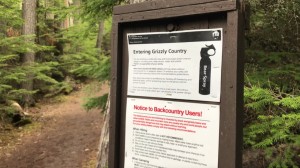
1,000 grizzly sightings that season and we were so afraid of accidentally startling a hungry mama bear that we tied bells to our packs and carried large canisters of red-pepper spray as we hiked. I didn’t tell her about the three guys from New Jersey who packed in their fishing poles and who, after catching five iridescent trout from the lake and cooking them in a pan with nothing more than a slab of butter and a splash from last night’s flat Budweiser, shared their breakfast with us. And how, even now, I cannot remember ever tasting anything so delicious.
Or about our time in Yellowstone when, after my new husband dunked his naked body in a warm spring, he emerged covered in tiny red worms.
Or about getting charged by a mountain goat, its enormous ringed horns missing me by a few inches as it raced by.
I didn’t bother telling her that our visit to Banff National Park was nothing short of awful—the campground was jam-packed with loud, partying park workers who found it terrifically fun to slingshot rocks at passing elk.

If I had more time, or I knew her better, I would have wanted to tell her about the delectable cheese sandwich we shared after hiking 4.5 miles to the Plain of Six Glaciers Tea House above Lake Louise.
And about finding the mountain sheep skull in the Gros Ventre Wilderness outside of Jackson Hole, and tying it to Victor’s backpack so we could keep it forever.
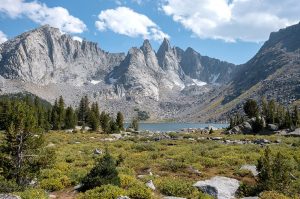
And about having to hike to higher and higher elevations in Wyoming’s Wind River Valley in a futile attempt to escape the swarms of mosquitos. Even at 12,000 feet, they found us. I had my period then and whenever I squatted to relieve myself, well…I’ll let your imagination do what it will with that.
I didn’t tell her that my brother-in-law and his dog joined us for a five-day trip to Oregon’s Three Sisters Wilderness Area—the final portion of our epic six-week honeymoon. I didn’t admit that even though I’d grown a wee bit tired of the smell of Dr. Bronner’s Peppermint soap, and eating dried rice noodles with dehydrated vegetables, and squeezing out the air from my Therm-a-Rest pad, and burying my poo and hiking in dirty socks, I was still super excited for our ONE LAST TREK.

I didn’t tell her that while I stood in the trailhead parking lot, stuffing my backpack for the last time, my lower back (long ago injured when I flew out the door of a moving car) started to ache. Just enough so that I thought it would be wise to keep the pack as light as possible.
I didn’t tell her that this last-second decision to jettison my Nikon camera, an extra pair of socks and my journal would come to haunt me for a lifetime. (Not the socks part.)
I didn’t tell her that after five hard, cold but blissful days spent exploring the stunning glacial lakes and enchanting alpine meadows of Faith, Hope and Charity, we’d packed up early and started hiking back to the car. Or about when we came to a spot where the trail wound widely around to the east, my brother-in-law and his brother decided it would be quicker to cut across a steep snow field. And about how I’d balked; said I wanted to stay on the trail where I could follow the footprints made by others.
“Okay,” my spouse anew had said, “We’ll meet you where the trail picks up again.”
I'd watched as they began to slide down the hill, the dog leaping up and over snowdrifts, before I continued on. I’d walked about fifteen minutes before reaching an area that was so packed down by snow and ice that footprints were impossible to detect. I’d momentarily panicked but kept moving until I found myself in a forested area completely devoid of all human disturbance. No broken branches. No tracks. No path either, for that matter.
I was 8.5 miles from the car—ostensibly an unsafe place to get lost.
It was then that I flashed on what Victor—the man who never should have let a woman with a very bad sense of direction hike alone—always said: “If you ever get separated from your group, you should go back to the place you were last together.”
I didn’t tell her how relieved I was when I found my way back to that very spot overlooking the snowfield. How I’d anxiously waited for what seemed like an hour in the silence, the wind, the snow, the sun, hoping that one of the men or possibly the dog would realize I was not where I was supposed to be and also turn around. How I’d cried with joy (and anger) when I heard voices coming towards me on the trail. How Victor hugged me close and apologized and promised he’d never ever leave me again.
So, what did I tell Kathy, the agent from Amica? I told her that when we'd finally arrived at the parking lot, many exhausting hours later, we found that our cars had been attacked by what might have been an angry sledgehammer. The windshield, driver’s side and passenger windows of our Honda Civic—the golden chariot that had in turn been our home, our nuptial bed, our kitchen and dining room, our closet and our shelter from the storm—were shattered to smithereens. Sharp shards stuck out from the frames like broken teeth. (Only the driver’s-side window of my brother-in-law’s truck received the same damning punishment.)
For a few seconds I wasn’t able to breathe, I was so shocked. Then, as I moved ever closer to the car and saw the vast emptiness within, I broke down.
They. Took. Everything.
Except the skull. They left the skull.
“We had to drive ten miles with the car like that,” I said to Kathy, recalling how I’d held a shirt over my face to keep the dust from the dirt road and the glass from the busted windows from blowing into my eyes. Victor wore his sunglasses, but kept getting nicked by flying debris.
We drove to the nearest town of Sisters and checked into the first cheap motel we saw because we needed to call the police (this was pre-iPhones, my friends). The policeman took our information, but warned us that this was a common occurrence in the area. “Meth heads,” the officer admitted.
“And then we called Amica.”
“I’m so sorry that happened to you,” Kathy said, obviously glad I was finally getting to the part that had any relevance to her. “I was crying hysterically and I remember the agent was incredibly sympathetic. She sent a glass repair service to the motel and fixed our cars. And you reimbursed us for some of our things, like the camera and camping stove and our clothes.” Kathy sighed. “I’m so glad we were there for you.” “Yup,” I stated a little too brusquely. I suddenly wanted to end the conversation and get on with my day. I didn't want to get all nostalgic; sad that my daughter would never see pictures of her young parents on top of snow-peaked mountains, sun-beaten, strong, and newly in love. I didn't wish to dwell on the many pages of intimate words I’d scribbled in that red-covered journal. Stolen thoughts that have long since turned to dust.
I reminded myself that nothing truly tragic happened to us that day. I didn't end up lost in the woods, frozen to death. Our Honda, with its shiny new windows, delivered us safely and soundly back home to Seattle. All that was really taken from us that day was stuff. Some of it we were able to replace. Some of it we'll just have to remember.
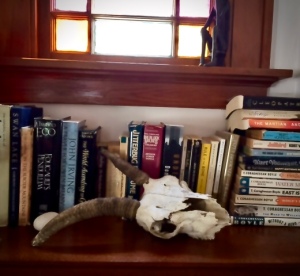
“I’m gonna read you the card now, okay?” I said, reaching toward my desk.
“Sure," Kathy replied. "Ready when you are."































































































